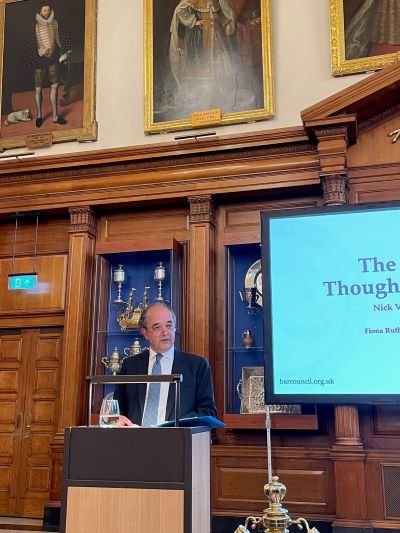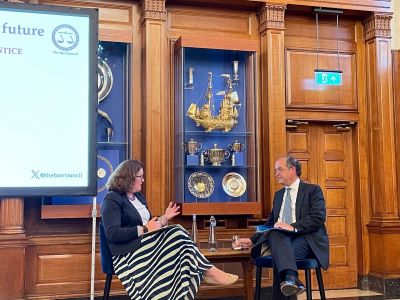
Nick points to the fact that “for every barrister with a practising certificate there are two who have never been entitled to a practising certificate. And of all the people in the world who are entitled to tell you they are barrister called to the Bar of England and Wales, only one in four has a practising certificate.”
In a wide-ranging speech on ‘The Bar of 2043’ Nick also explores what the profile of the Bar would look like in 20 years’ time, and the factors that could change what practice at the Bar will look like: artificial intelligence (AI), mandatory use of alternative dispute resolution, remote hearings, hybrid working, and changing business models for chambers.
The Chair’s speech was delivered to an audience of barristers, politicians, and colleagues in the wider justice system at Inner Temple Hall on Wednesday 13 September, and followed by a discussion with Fiona Rutherford, Chief Executive of JUSTICE, probing some of the issues further.
On timing of Call, Nick said:
“My own view is that we should call people to the Bar only when they have satisfactorily completed pupillage, with some sort of provisional call or provisional practising certificate to cover the second six. The Bar Council strongly supports such a change… We have this obvious anomaly of conferring the title barrister before the qualification process is complete. I fear that if we do nothing the problem will get worse, that it will become increasingly difficult to resolve, and that it poses a long-term risk to the profession. The problem is readily fixable, and it should be fixed now. We must all rise to the challenge.”
On what the Bar will look like in 20 years, Nick pointed to the profile of the junior end of the profession as the biggest single determinant of what the senior end will look like. He said:
“… in terms of recruitment to the practising Bar we now have an intake to the Bar that very closely reflects the general population demographic in terms of gender and race. I think that this is important. It is what you would hope to see if recruitment is open and meritocratic…
“Looking forward to the Bar of 2043 I think the picture is mixed, in terms of equality and diversity. We can already be sure that the Bar of 2043 will be more diverse and much better reflect the mix of race and gender in society, than the Bar as it is today. So, in terms of getting in, we appear to operate pretty meritocratically, although I believe we have more to do in terms of social mobility.”
On social mobility Nick announced that the Bar Council is partnering with Rare Recruitment to integrate a contextual recruitment system into the Pupillage Gateway from 2024/25. He said:
“… the Bar and the Inns can be very daunting, very off-putting, for those who come from what are sometimes called non-traditional backgrounds (although I don’t much like that expression) and … what we ought to be interested in when we recruit to pupillage is potential – how good a barrister you can soon become – and that may not be exactly the same as what grades and extracurricular activities you can put on your CV.”
On artificial intelligence, Nick encouraged the Bar to engage with developments in new technology. He said:
“… I very much doubt that we will be replaced by robots or Chatbots or AI – at least in the next 20 years. But we do need to make it our business to understand what AI can do, and to understand enough about how it does it, so that we can appreciate both its capacities and its weaknesses. A head-in-the-sands approach is not remotely advisable, but neither should you be asking GPT to settle your skeleton arguments.”
On alternative dispute resolution (ADR), Nick predicts it will increase. He said:
“The mandatory use of ADR as precursor to bringing proceedings is, I think, likely to increase. Although that will create opportunities for barristers, I think its net effect may be to close off more work than it opens up. The Bar Council will be intervening in an important Court of Appeal case this autumn which is likely to consider whether and in what circumstances a court can direct ADR as mandatory precursor to the issuing of proceedings: watch this space.”
On remote hearings, Nick hopes that its use will reduce. He said:
“I suspect that some increase in the use of remote hearings, above pre-Covid levels, is here to stay. But I hope that their use will reduce from present levels… Save where there are very good reasons to the contrary, people’s rights and obligations should be determined face-to-face, with a proper degree of formality in a real room to which the public and journalists have access, and in which every participant can see and hear everyone, and can see and hear everything, that is happening. We have a name for rooms like that – court.”
Looking ahead 20 years Nick sets out his hope for the future. He said:
“…what I hope I will see then is a thriving Bar which is a true meritocracy, in which the ablest succeed irrespective of background or gender or race; I would like to see a Bar which remains overwhelmingly a referral profession, and which provides excellent service to its clients whilst remaining true to its first duty which is to the Court.”
